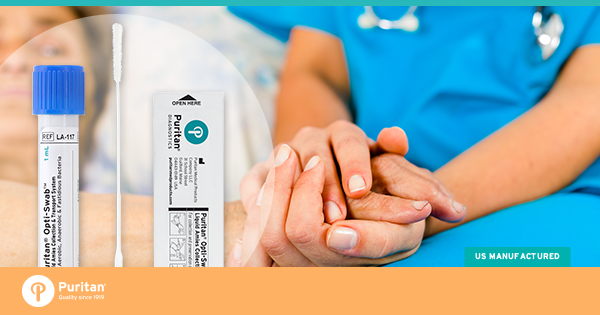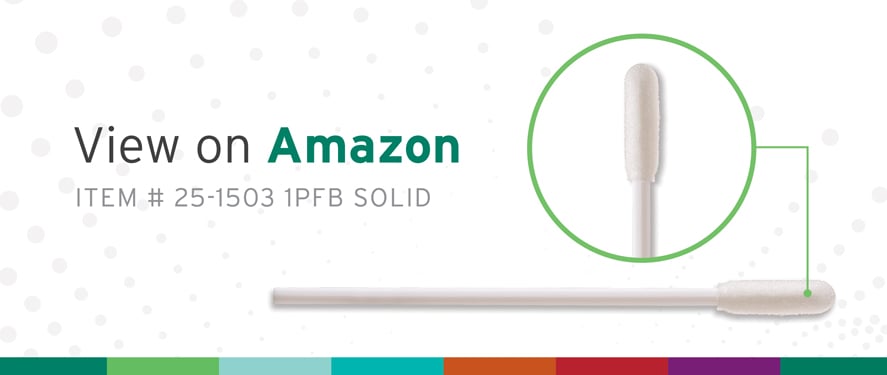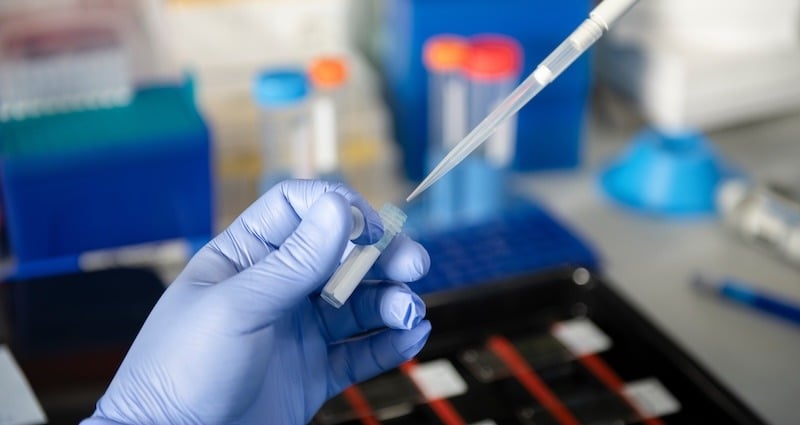
Healthcare swabs are one of our specialties as a company. Through our research and interactions with many different types of healthcare providers, we have come to know how incredibly difficult and important their work is. Our goal is to make sure our swabs provide the end user with exactly what they need so they can always perform at the highest level.
In this article, we review what MRSA is, why using a nasal swab is the most effective method for MRSA testing, and how to do a MRSA nasal swab test.
What is MRSA?
MRSA are types of Staphylococcus aureus, or "staph," bacteria types that are present in the nose of about 25-30% of U.S. adults. S. aureusis usually innocuous and asymptomatic, but sometimes, when there is a break in someone's skin or if someone's immune system is weakened, the bacteria can cause an infection. Unfortunately, certain strains of S. aureus have built up an immunity to many types of antibiotics over the years. These strains can cause skin infections at a minimum; pneumonia, bloodstream infections, or infections at a surgical site are at the severe end of the spectrum.
MRSA bacteria can be contagious through both through person-to-person contact and when a contaminated person touches objects or surfaces, leaving bacteria that can be transferred. Around 126,000 people are hospitalized, and 19,000 die each year because of the bacteria.
According to the CDC, MRSA can cause severe problems, including:
- Bloodstream infections
- Pneumonia
- Surgical site infections
- Sepsis
- Death
What is a MRSA Nasal Swab?
A MRSA nasal swab refers to a type of clinical swab that is used to collect a bacterial specimen from the inside of the patient’s nostril for the specific purpose of testing for methicillin-resistant Staphylococcus aureus (MRSA).
MRSA swabbing is part of routine screening in hospitals, surgical centers, and other healthcare settings where MRSA colonization needs to be identified and managed both proactively and reactively.
What is a MRSA Nasal Swab Test?
The MRSA nasal swab test is as simple as it sounds. A sterile swab is inserted into the anterior nares, about 2 cm in, and rotated to gather epithelial cells and any present bacteria.
What’s crucial is not just the testing method, which we will cover later in this piece, but also the type of swab and transport system used. A high-quality swab can help to ensure sufficient sample uptake from the nose (and release), while the transport medium keeps the sample viable until the lab can process it.
MRSA nasal swabs aren’t used to diagnose an infection directly. Instead, they identify carriers. Carriers are individuals who harbor bacteria in their nasal passages without signs of illness. These individuals can still transmit MRSA to others and develop an infection themselves if the bacteria enter the body via wound, catheter, or surgical incision.
When and Where are MRSA Swabs Used?
Swabs used for collecting MRSA specimens are extremely common in healthcare settings to help identify individuals who are colonized with MRSA, even if they aren’t actively infected. The goal? Early detection. Identifying MRSA carriers can enable healthcare providers to isolate carriers, implement decolonization protocols, and help prevent the spread of MRSA to other vulnerable patients.
Here are some of the most common use cases for MRSA swab tests:
- Pre-Operative Screening - You may receive a MRSA nasal swab test before a scheduled surgery to help reduce the risk of post-surgical infections.
- Hospital Admissions - Some facilities may conduct MRSA screening upon admission. This is especially common for patients entering the ICU or undergoing dialysis.
- Long-Term Care Facilities - If you (or a loved one!) are entering a long-term care facility, you may receive a MRSA nasal test to help limit the liklihood of a MRSA outbreak.
- In Response to an Outbreak - It’s extremely common to be tested for MRSA in the event of an existing outbreak to help identify and isolate carriers and help to contain the outbreak itself.
- Infection Control Programs - Routine surveillance of high-risk populations is also common for testing. Groups in this category can include those with indwelling devices, chronic wounds, or those with compromised immune systems.
Early identification via nasal swab allows infection prevention teams to intervene before MRSA causes harm. It also helps to support antimicrobial stewardship by reducing the unnecessary use of broad-spectrum antibiotics.
The Effectiveness of MRSA Nasal Swabs
According to the American Society for Microbiology, nasal swabs have higher MRSA detection rates than do axillary and groin swabs. Further, studies have shown "best results are obtained by using a flocked swab in combination with Amies transport medium." Flocked swabs provide better sample collection due to their brush-like tip, which releases higher numbers of target cells and retains more liquid sample than foam swabs.
Our Opti-Swab sterile swabs were designed for the collection and transport of clinically significant bacteria. The high-performance swab tip features our patented HydraFlock® swab with a molded breakpoint that makes sampling fast, safe, and convenient. Each is packaged with a vial that contains 1 ml of Amies medium for transport and elution.
How to Swab for MRSA
Once a swab and transport medium, like Puritan's Opti-Swab Media Transport System, are selected, the tester should wash his or her hands and put on clean gloves. The Center for Disease Control then outlines the following steps:
- Twist to remove the cap from the transport tube.
- Remove the swab.
- Insert the swab approximately 2 cm (approximately 3/4 inches) into one nostril.
- Rotate the swab against the anterior nasal mucosa for 3 seconds.
- Using the same swab, repeat for the other nostril.
- Place swab back into the transport tube.
- Place the end of the swab firmly to ensure the swab tip comes in contact with the moistened pledget.
- Secure the transport tube cap.
Hospitals and clinics may advise nurses to use other media and methods, but our hope is to provide a valuable resource for those who use Puritan products. It's the least we can do considering your time and sacrifice spent helping others. So thank you and Happy Nurses Week!
Still have questions about swabbing for MRSA, or about other Puritan disposable medical products? Contact us today!
Publishing how-to guides, like "How to Swab for the Flu" and "How to Collect a Throat Swab Specimen", is one way we provide support to the end users of our products. Many of these methods are used by nurses with our products on a daily basis.
Sources
-
Centers for Disease Control and Prevention. Methicillin-resistant Staphylococcus aureus (MRSA) Basics. CDC, https://www.cdc.gov/mrsa/index.html.
-
Centers for Disease Control and Prevention. Clinical Overview of Methicillin-resistant Staphylococcus aureus (MRSA) in Healthcare Settings. CDC, https://www.cdc.gov/mrsa/hcp/clinical-overview
-
Centers for Disease Control and Prevention. Laboratory Testing for Methicillin (oxacillin)-resistant Staphylococcus aureus (MRSA). CDC, https://www.cdc.gov/mrsa/php/laboratories/index.html. Accessed 28 Aug. 2025.
-
Van Hal SJStarkD, Lockwood B, Marriott D, Harkness J. 2007. Methicillin-ResistantStaphylococcus aureus(MRSA) Detection: Comparison of Two Molecular Methods (IDI-MRSA PCR Assay and GenoType MRSA Direct PCR Assay) with Three Selective MRSA Agars (MRSA ID, MRSASelect, and CHROMagar MRSA) for Use with Infection-Control Swabs. J Clin Microbiol45: https://doi.org/10.1128/jcm.00139-07




